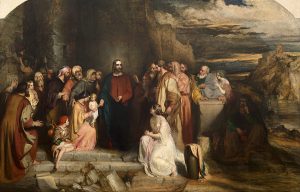Illuminations on the Lectionary readings for Aug. 28, 2022 (Pentecost 12C)
First Reading (Track One): Jeremiah 2:4-13
Last week we heard the youthful Jeremiah resisting God’s call to prophesy, fearing that he was too young for such a responsibility.

Christ Teacheth Humility (1847), oil painting on canvas by Robert Scott Lauder (1803-1869). National Gallery of Scotland, Edinburgh. (Click image to enlarge.)
Reassured by God’s kind words and gentle touch, Jeremiah now assumes the prophet’s mantle and imagines God in an anguished reverie, a deep lament. What could have gone wrong with the chosen people? Did they find some wrong in God that led them to waste their lives on worthless things? More in sorrow than in anger, it seems, God reflects that the Chosen People have forsaken God’s living water, instead building cracked cisterns that won’t slake their spiritual thirst.
First Reading (Track Two): Sirach 10:12-18
Sirach is one of the deuterocanonical books, also known as the Apocrypha, that we find at the end of the Hebrew Bible. It was written late in the years before Jesus, after Israel had come under Greek rule, Sirach is also known as Ecclesiasticus (not to be confused with Ecclesiastes), a Latin name it was given after the reign of Constantine. By either name, it concisely sums up Torah – God’s teaching – in the genre of wisdom literature: brisk, memorable suggestions of spiritual advice. Sunday’s Track Two first reading follows the theme of the day’s readings: Pride leads to sin, and sin leads to no good end. In language that may remind us of the Song of Mary, the Magnificat, it warns that proud rulers will be overthrown and replaced by the lowly.
Alternate First Reading (Track Two): Proverbs 25:6-7
Open your Bible to the book of Proverbs some time. You’ll be intrigued by the nuggets of wisdom that you’ll see there, many of them still seeming fresh and modern. Tradition attributes Proverbs to King Solomon, but modern theologians understand it as a broad collection of some 500 small gems of ancient wisdom about life, love and morals. This very brief reading, an alternate option for Track Two, foreshadows Jesus’ parable in Sunday’s Gospel: “… all who exalt themselves will be humbled, and those who humble themselves will be exalted.”
Psalm (Track One): Psalm 81:1,10-16
This resounding hymn of praise seems to reflect Jeremiah’s words: We sing with joy to God who is our strength, and we remember God bringing the people out of slavery and feeding them abundantly. But the people were stubborn, did not listen, and God allowed them to go their own way. Now we hear a grieving God, who would feed and nurture the people again, if only they would return.
Psalm (Track Two): Psalm 112
Sunday’a Track Two Psalm harmonizes with the First Reading and Gospel in its reflection on God’s covenants with Abraham and Moses. We are called to follow God’s commandments to be just, to serve our neighbors, share our wealth and provide for the poor. By living generously in this way, with right hearts and trust in God, we can be secure and live without fear.
Second Reading: Hebrews 13:1-8, 15-16
Love one another as God loves us, and remember to do good, to share with one another, and to show hospitality (as we are told that the patriarch Abraham did when he hospitably received visiting angels). Sunday’s reading from Hebrews, concluding our four weeks with this letter, offers simple pastoral advice on living as God would have us live: : Love one another as God loves us, and remember to do good, to share with one another, to live simply and shun riches, and to hold hospitality as a virtue.
Gospel: Luke 14:1, 7-14
At first Sunday’s Gospel seems like useful advice from Jesus about simple humility in social settings: Don’t assume that the seat of honor is saved for you, or you’ll be embarrassed when the host tells you to move down. Better to take a humble place and then bask in a happy glow as the host comes and escorts you upward. But the words, as Jesus’s teachings so often do, prove to have a deeper meaning. Jesus isn’t just concerned about mealtime manners. He teaches us the way we should treat others, especially those who are unable to reciprocate in kind.
